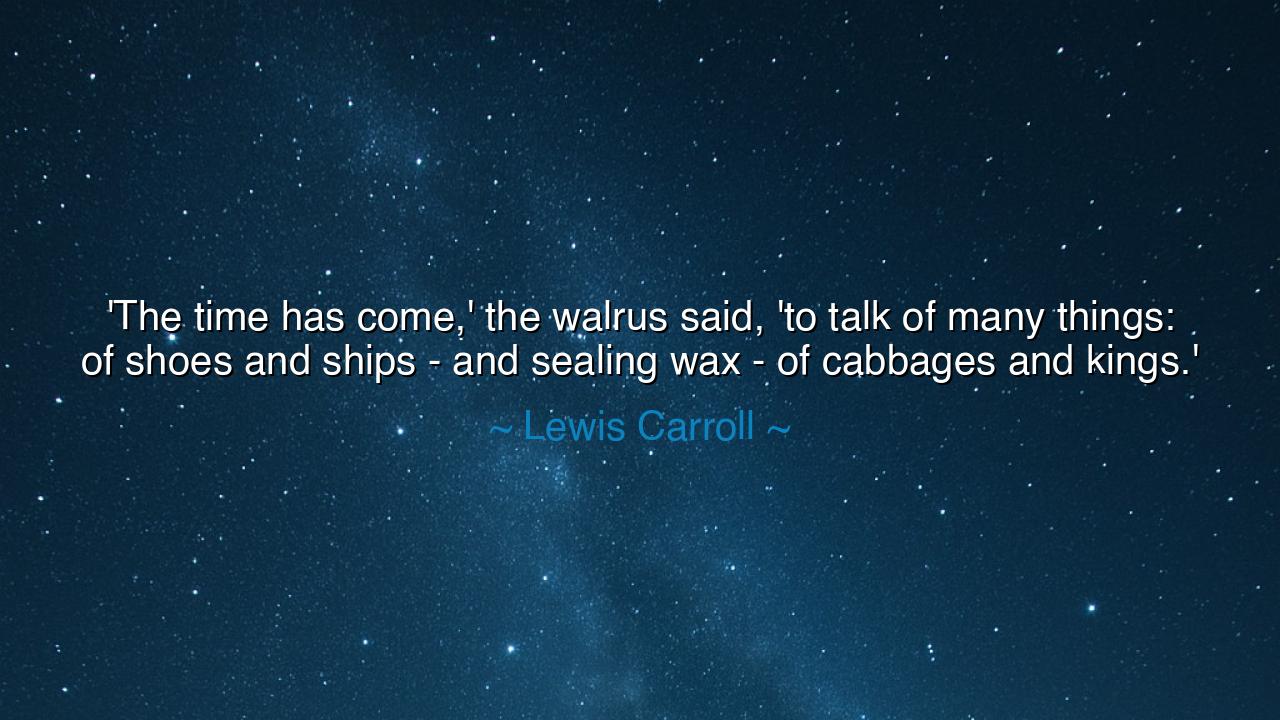
'The time has come,' the walrus said, 'to talk of many things:
'The time has come,' the walrus said, 'to talk of many things: of shoes and ships - and sealing wax - of cabbages and kings.'






The words of Lewis Carroll—“‘The time has come,’ the walrus said, ‘to talk of many things: of shoes and ships—and sealing wax—of cabbages and kings.’”—first appear in his fantastical poem The Walrus and the Carpenter within Through the Looking-Glass (1871). At first glance, they may seem whimsical, a jumble of nonsense in the dreamlike world Carroll created. Yet beneath their playful surface lies a deeper current of wisdom: the truth that life is vast, filled with both the ordinary and the grand, the humble cabbages and the mighty kings, all bound together in the great fabric of existence.
To the ancients, this mingling of high and low would not have been strange. The philosophers of old often taught that to understand life fully, one must grasp not only the workings of empires but also the growth of gardens, not only the art of governance but also the simplicity of daily bread. Carroll, in his playful English tongue, reminds us of this eternal lesson: life is a conversation that must hold both the trivial and the profound. Shoes and ships, sealing wax and kings—all matter, for all are threads in the same tapestry.
Yet there is also satire here. Carroll lived in an age of empire, when rulers held immense power but were often detached from the common lives of their people. By placing cabbages and kings side by side, he gently mocks the pretensions of authority. The walrus, a creature of no majesty, declares that the time has come to speak of lofty matters alongside nonsense. In this way, Carroll reminds us that the great are not so far from the humble, and that wisdom often emerges from unexpected mouths.
History provides us striking examples of this truth. Consider Diogenes, the Cynic philosopher of Greece. When Alexander the Great stood before him and offered to grant any wish, Diogenes replied only, “Stand out of my sunlight.” In that moment, the king of kings was reduced to the level of a cabbage: both subject to the same sun, both mortal, both equal in the vastness of time. Carroll’s playful pairing of opposites carries this same spirit—that the lofty and the lowly are never as distant as pride imagines.
Beloved listener, the meaning for us is clear: life must not be divided into sacred and trivial, into the matters of the great and the matters of the small. To speak wisely, to live fully, we must embrace all of it. Let your conversations, your thoughts, your wonderings be wide enough to hold both the majesty of kings and the simplicity of cabbages. For to neglect one is to misunderstand the other, and to see both together is to grasp the unity of the world.
Practical wisdom calls us to action: when you gather with others, do not speak only of power or wealth, nor only of trifles and amusements. Let your talk be rich, flowing from the practical to the philosophical, from the near to the eternal. Be unashamed to find wonder in the ordinary, or to laugh at the mighty. For in this balance, you will find both humility and joy, and your spirit will grow wide enough to hold the whole of life.
So let Carroll’s whimsical words be remembered not merely as nonsense verse, but as parable: “The time has come… to talk of many things.” The time is always now, for life is fleeting and full. Do not narrow your mind to one subject or one concern—embrace the vastness, the humor, the paradox of existence. For in the dance of cabbages and kings, of shoes and ships, lies the fullness of what it means to be human.






AAdministratorAdministrator
Welcome, honored guests. Please leave a comment, we will respond soon